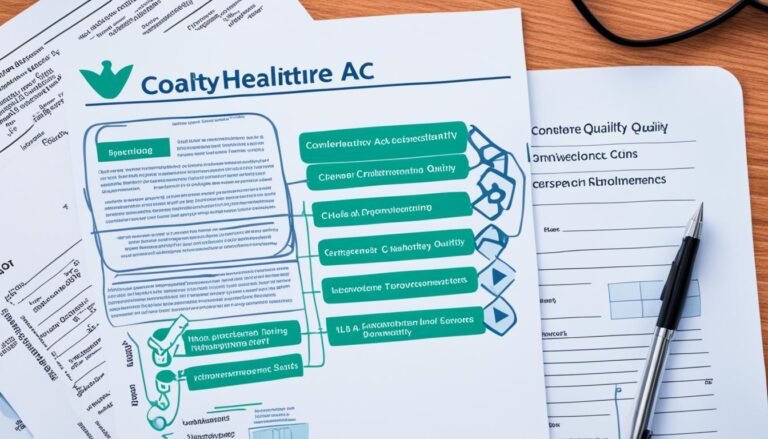Understanding the Medicaid Fraud Control Unit
The Medicaid Fraud Control Unit (MFCU) plays a vital role. In just one year, they got back over $1 billion that was wrongly paid. This shows how important MFCU is in fighting Medicaid fraud in the U.S. Congress set it up in 1977 to protect Medicaid and make sure healthcare providers follow the law. They aim to keep taxpayer money safe and enforce justice by exposing fraud. With their skilled teams, the MFCU is key to combating healthcare fraud, waste, and abuse.
The Medicaid Fraud Control Unit is a specialized law enforcement agency. They dig deep to find false claims and prosecute those cheating the system. By doing detailed investigations, the MFCU keeps the trust in Medicaid services. This helps those who depend on Medicaid for their healthcare.
Key Takeaways
- The MFCU has a successful track record of recovering funds, ensuring the Medicaid program is preserved for those in need.
- Medicaid fraud investigations are essential in upholding the integrity and effectiveness of healthcare services.
- The MFCU operates with a core mission to deter fraudulent activity and protect Medicaid beneficiaries.
- With the intensive efforts of the MFCU, the healthcare system remains vigilant against wasteful spending.
- The investment in Medicaid fraud control translates to significant savings and efficacy within the Medicaid program.
The Role and Mission of the Medicaid Fraud Control Unit
The Medicaid Fraud Control Unit (MFCU) started as a key part of US healthcare history. Congress created MFCU to fight fraud, waste, and abuse in Medicaid. It plays a crucial role in finding fraud and keeping Medicaid fair for those in need.
Establishment of MFCU by Congress in 1977
In 1977, Congress established MFCU through the Medicare-Medicaid Anti-Fraud and Abuse Amendments. This important step showed the government’s promise to keep Medicaid funds for real health care services. It also made sure those who cheat the system can be caught.
MFCU’s Core Objective: Protecting Medicaid and its Beneficiaries
The main goal of the Medicaid Fraud Control Unit is to protect Medicaid and its users. MFCU works hard to keep Medicaid trustworthy and make sure all providers follow the rules. This shows MFCU’s dedication to its mission and role in health care.
Separation from State Medicaid Programs to Prevent Conflict of Interest
MFCU works separately from state Medicaid programs to stay unbiased in its investigations. This separation is key to avoiding conflicts of interest and helps MFCU focus on fighting fraud by Medicaid providers. Keeping this independence is crucial for MFCU to do its job well and without bias.
| Year Established | Mission | Operational Structure |
|---|---|---|
| 1977 | Fraud detection and protection of Medicaid resources | Independence from state Medicaid programs |
| Federal Mandate | Medicare-Medicaid Anti-Fraud and Abuse Amendments | |
MFCU’s Enforcement Actions and Healthcare Fraud Prevention
The Medicaid Fraud Control Unit (MFCU) works hard to fight healthcare fraud. They carry out strong actions to stop fraud and protect people’s money and health. This helps find and stop fraud in the healthcare system.
Analyzing Enforcement Statistics for Effective Fraud Deterrence
Healthcare fraud prevention is key for MFCU. They carefully look at data to spot fraud trends. This helps them improve their plans to catch fraud and stop it before it happens.
The Impact of MFCU Investigations on Combatting Medicaid Provider Fraud
MFCU enforcement actions make a big difference. They show that fraud will not be tolerated. This keeps Medicaid strong and gives peace of mind to everyone involved.
Structure and Organization of the Medicaid Fraud Control Unit
The Medicaid Fraud Control Unit (MFCU) has a complex structure that is key to its success. It includes a strong organization of skilled professionals working together efficiently. Attorneys, investigators, and auditors collaborate to achieve great results.
The Integration of Attorneys, Investigators, and Auditors
Attorneys, investigators, and auditors are crucial to the MFCU. They work together closely, merging their skills to fight Medicaid fraud effectively. Attorneys handle the legal side, investigators do detailed work, and auditors examine the financial aspects.
These professionals ensure every investigation is thorough and accurate. Their team effort helps the MFCU succeed in tackling Medicaid fraud cases. This collaboration is essential for bringing wrongdoers to justice.
Annual Certification by the Department of Health and Human Services
All Medicaid Fraud Control Units are certified yearly by the Department of Health and Human Services. This ensures they meet high standards and follow federal guidelines. The certification shows their commitment to excellence and protecting Medicaid resources.
| Role | Main Responsibilities | Contribution to MFCU |
|---|---|---|
| Attorneys | Legal analysis, prosecution, and advisory | Ensuring cases are legally sound and prosecutable |
| Investigators | Fieldwork, evidence gathering, interviews | Building fact-based foundations for legal actions |
| Auditors | Financial analysis, record examination, identifying discrepancies | Uncovering financial malpractices within billing and claims |
Each role in the MFCU plays a vital part in fighting fraud. Attorneys, investigators, and auditors join forces to challenge Medicaid fraud. Their skills ensure the unit works professionally, maintaining Medicaid’s integrity for the future.
Multi-Disciplinary Approach to Medicaid Fraud Detection
The fight against Medicaid fraud uses a multi-disciplinary approach. It brings together experts from different fields. This way, it forms a strong team against illegal activities. Each expert adds their knowledge and view, making the strategy against fraud stronger and more detailed. This method shows how working together is key in stopping fraud. It makes using resources better and helps have a bigger effect.
Working together isn’t just for the Medicaid Fraud Control Unit’s team. It also includes healthcare experts who know the norms and can spot odd things, police forces with skills in wide criminal investigations, and other government groups. These groups help make sure the healthcare system follows rules and standards. The table below shows the role and help each group brings to this united effort.
| Stakeholder | Role in Medicaid Fraud Detection | Contributions to Collaboration |
|---|---|---|
| Healthcare Professionals | Subject Matter Experts | Identification of irregular medical billing and patient care patterns |
| Law Enforcement Agencies | Investigative Partners | Provision of criminal investigative skills and resources |
| Government Entities | Regulatory Oversight | Ensuring adherence to healthcare policies and standards |
By putting together the skills and authority of different groups, the Medicaid Fraud Control Unit gets better at finding and responding to fraud. This team effort not just catches fraud but also protects the Medicaid program. It makes sure those using Medicaid are safe from being taken advantage of and hurt.
Medicaid Fraud Control Unit’s Prosecution Powers
The Medicaid Fraud Control Unit (MFCU) has strong powers to fight fraud. It works hard to keep Medicaid integrity intact. The unit has the right to open criminal case prosecutions and civil case prosecutions. They target those who illegally take money from the Medicaid system.
The MFCU fights fraud in two main ways. First, it focuses on criminal case prosecutions. This is to punish those who commit fraud. Penalties can include jail time. Then, it handles civil case prosecutions. This aims to get back wrongfully taken funds and fine the guilty parties. This helps return funds to Medicaid.
Criminal and Civil Case Prosecutions to Uphold Medicaid Integrity
The MFCU plays a vital role in protecting Medicaid. Through criminal prosecutions, it punishes and stops future fraud. Civil cases help get back lost money. This supports the program and helps those who rely on Medicaid.
The Relevance of the Civil False Claims Act in MFCU Prosecution
The Civil False Claims Act is key for the MFCU. It helps them chase those who make false claims for government money. Thanks to this act, the MFCU can work well and effectively. This makes them stronger in their fight against fraud.
| Prosecution Type | Objective | Outcome |
|---|---|---|
| Criminal Prosecution | To punish and deter Medicaid fraud | Convictions, imprisonment, fines |
| Civil Prosecution | To recover funds and prevent fiscal loss | Financial recoveries, penalties |
The MFCU helps maintain trust in Medicaid. It ensures everyone follows the rules. This keeps the program strong for those who need it.
Historical Perspective: Establishment of Medicaid Fraud Control Units
Looking into Medicaid Fraud Control Unit history is important. We see that critical laws began their journey. The Medicare-Medicaid Anti-Fraud and Abuse Amendments were key. They helped start state-level Medicaid Fraud Control Units. These units play a major role in keeping Medicaid services honest across the U.S.
Medicare-Medicaid Anti-Fraud and Abuse Amendments
Legislation in the late 1970s sparked the creation of MFCUs. The Medicare-Medicaid Anti-Fraud and Abuse Amendments set the stage to fight Medicaid misuse. These laws showed a real promise to protect Medicaid’s financial and ethical integrity.
Incentive Funding for States to Counteract Medicaid Provider Fraud
The amendments brought incentive funding for the states. This move meant states got both motivation and money to fight Medicaid fraud. With more funds, states could better tackle fraudulent actions within Medicaid programs.
This table shows how MFCUs have grown, thanks to those amendments and funding:
| Year | Development | Impact |
|---|---|---|
| 1977 | Enactment of the Medicare-Medicaid Anti-Fraud and Abuse Amendments | Legal framework established for the creation of MFCUs |
| 1978 | States begin to establish MFCUs | Improvement in states’ abilities to investigate and combat Medicaid fraud |
| 1980s–2000s | Continued expansion and support for MFCUs through incentive funding | Increase in the number of successful fraud cases and recoveries |
| Today | Ongoing operations and modernization of MFCUs | Protection and forward evolution of Medicaid integrity |
Over time, Medicaid Fraud Control Units have been growing and getting better. They’ve been successful in keeping the Medicaid program safe from fraud. They also help maintain the public’s trust and protect resources.
Medicaid Fraud Control Unit (MFCU)
The Medicaid Fraud Control Unit (MFCU) is crucial in keeping healthcare honest. It protects Medicaid’s integrity and the well-being of its users. By checking claims and probing possible abuse, the MFCU helps bring justice in healthcare fraud. Its hard work discourages illegal actions, ensuring a fair market and maintaining public trust in healthcare.
As protectors of Medicaid, MFCU teams tackle complex fraud cases. They join forces with legal experts, using vast knowledge to ensure accountability. This teamwork teaches providers how to follow rules and punishes those who break them.
The MFCU’s mission extends beyond prosecution; it’s about fostering a healthcare system that’s immune to fraud and strong enough to provide quality care for all. – Healthcare Compliance Official
The MFCU also focuses on prevention. It spots weak spots in Medicaid to improve future fraud prevention. By enhancing fraud detection, the MFCU shows its commitment to adapt and stay vigilant.
Data highlights the MFCU’s impact in overseeing Medicaid. Key stats show their success and the battles they face against Medicaid fraud.
| Performance Metric | Impact |
|---|---|
| Number of Investigations Initiated | Measures proactive efforts and resource allocation |
| Number of Fraudulent Providers Prosecuted | Reflects effective legal action and deterrence power |
| Amount Recovered from Fraudulent Claims | Represents financial restitution to the Medicaid program |
| Rate of Convictions | Indicates success in holding offenders accountable |
The Medicaid Fraud Control Unit is committed to its role. It makes sure healthcare providers act ethically and that Medicaid’s resources go to those in need. The MFCU is key in fighting fraud and building trust in our healthcare system.
Strategies for Medicaid Compliance and Fraud Investigation
States spend a lot on Medicaid, making up a big part of their budgets. It’s important to have good strategies for Medicaid compliance and to check for fraud. These steps help keep state budgets healthy. They make sure Medicaid money helps those who really need it. Fraud by providers and misuse by patients are big problems. States need smart plans to keep the Medicaid program honest and strong.
Medicaid Program Expenditures and State Budgets
Medicaid costs are huge, so states must be careful with their budgets. They need to make sure Medicaid follows the rules. This protects taxpayers’ money. Finding fraud helps avoid wasteful spending. Strategies include regular checks and taking back money that was wrongly paid. These actions are key to managing Medicaid well.
Targeting Medicaid Provider Fraud and Patient Abuse
Fighting fraud and abuse in Medicaid starts with saying it’s not allowed. States use technology to find fraud. They use data analytics and look for patterns of fraud. Training for providers promotes honesty. This cuts down on abuse. Keeping Medicaid safe means a lot of work in different areas. Tough rules, training, and community tips help keep Medicaid right and efficient.
FAQ
What is the Medicaid Fraud Control Unit (MFCU)?
The MFCU is a key law enforcement group. It fights against fraud by Medicaid providers.
When was the Medicaid Fraud Control Unit (MFCU) established?
Congress created the MFCU in 1977. They did this through the Medicare-Medicaid Anti-Fraud and Abuse Amendments.
What is the primary mission of the Medicaid Fraud Control Unit (MFCU)?
Its main goal is to keep the Medicaid program and its users safe. It does this by fighting fraud, waste, and abuse.
How is the Medicaid Fraud Control Unit (MFCU) structurally separated from state Medicaid programs?
It’s set up apart from state Medicaid programs to prevent any conflict of interest. This helps keep investigations fair and honest.
What enforcement actions does the Medicaid Fraud Control Unit (MFCU) take?
The MFCU takes steps to fight and stop healthcare fraud. They do this through various enforcement actions.
How does analyzing enforcement statistics help the Medicaid Fraud Control Unit (MFCU) combat fraud?
Looking at enforcement stats helps the MFCU see fraud patterns. This lets them create strong plans to fight fraud and save Medicaid money.
What impact do Medicaid Fraud Control Unit (MFCU) investigations have?
MFCU’s successful cases scare off would-be fraudsters. They play a big part in keeping Medicaid honest.
What is the structure of the Medicaid Fraud Control Unit (MFCU)?
The MFCU combines lawyers, investigators, and auditors. Together, they go after complex Medicaid fraud cases.
How does the Medicaid Fraud Control Unit (MFCU) ensure compliance with federal regulations?
It gets checked every year by the Department of Health and Human Services. This ensures it meets federal rules and works at its best.
How does the Medicaid Fraud Control Unit (MFCU) utilize a multi-disciplinary approach to detect Medicaid fraud?
The MFCU works with healthcare folks, police, and other government bodies. This team effort helps them spot and look into fraud.
What types of cases does the Medicaid Fraud Control Unit (MFCU) prosecute?
The MFCU can handle both criminal and civil cases to protect Medicaid’s integrity.
What is the historical background of Medicaid Fraud Control Units?
These units started back in 1977. They were Congress’s answer to the need for tighter Medicare-Medicaid fraud controls.
What is the relevance of the Civil False Claims Act in Medicaid Fraud Control Unit (MFCU) prosecutions?
The Civil False Claims Act helps the MFCU bring legal action. It aims to get back money from false claims and punish those cheating Medicaid.
What are the strategies for Medicaid compliance and fraud investigation?
It’s vital to have good plans and thorough investigations to protect Medicaid. This helps stop fraud and keeps patients from harm.







